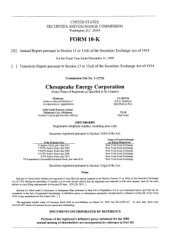Chesapeake Energy 1999 Annual Report Download - page 18
Download and view the complete annual report
Please find page 18 of the 1999 Chesapeake Energy annual report below. You can navigate through the pages in the report by either clicking on the pages listed below, or by using the keyword search tool below to find specific information within the annual report.
negotiations of contracts with governmental entities, and
import and export regulations.
In addition, in the event of a dispute, we may be required to litigate the dispute in Canadian courts since we may not
be able to sue foreign persons in a United States court.
The Loss of Either the CEO or the COO Could Adversely Affect Operations.
Our operations are dependent upon our Chief Executive Officer, Aubrey K. McClendon, and our Chief Operating
Officer, Tom L. Ward. The unexpected loss of the services of either of these executive officers could have a
detrimental effect on our operations. We maintain $20 million key man life insurance policies on the life of each of
Messrs. McClendon and Ward.
Transactions with Executive Officers May Create Conflicts of Interest.
Messrs. McClendon and Ward have the right to participate in certain wells we drill, subject to certain limitations
outlined in their employment contracts. As a result of their participation, they routinely have significant accounts
payable to Chesapeake for joint interest billings and other related advances. As of December 31, 1999, Messrs.
McClendon and Ward had payables .to Chesapeake of $2.5 million and $1.8 million, respectively, in connection with
such participation. These amounts were reduced to $2.2 million and $1.2 million, respectively, as of March 22,
2000. The rights to participate in wells we drill could present a conflict of interest with respect to Messrs.
McClendon and Ward.
The Ownership of a Significant Percentage of Stock by Insiders Could Influence the Outcome of Shareholder Votes.
At March 22, 2000, our Board of Directors and senior management beneficially owned an aggregate of
25,788,818 shares of conmion stock (including outstanding vested options), which represented approximately 24%
of our outstanding shares. The beneficial ownership of Messrs. McClendon and Ward accounted for 21% of the
outstanding common stock. As a result, Messrs. McClendon and Ward, together with other officers and directors of
Chesapeake, are in a position to significantly influence matters requiring the vote or consent ofour shareholders.
Regulation
General
Numerous departments and agencies, federal, state and local, issue rules and regulations binding on the oil and
gas industry, some of which carry substantial penalties for failure to comply. The regulatory burden on the oil and
gas industry increases the Company's cost of doing business and, consequently, affects its profitability.
Exploration and Production
The Company's operations are subject to various types of regulation at the federal, state and local levels. Such
regulation includes requiring permits for the drilling of wells, maintaining bonding requirements in order to drill or
operate wells and regulating the location of wells, the method of drilling and casing wells, the surface use and
restoration of properties upon which wells are drilled, the plugging and abandoning of wells and the disposal of
fluids used or obtained in connection with operations. The Company's operations are also subject to various
conservation regulations. These include the regulation of the size of drilling and spacing units and the density of
wells which may be drilled and the unitization or pooling of oil and gas properties. In this regard, some states (such
as Oklahoma) allow the forced pooling or integration of tracts to facilitate exploration while other states (such as
Texas) rely on voluntary pooling of lands and leases. In areas where pooling is voluntary, it may be more difficult to
form units and, therefore, more difficult to develop a prospect if the operator owns less than 100% of the leasehold.
In addition, state conservation laws establish maximum rates of production from oil and gas wells, generally prohibit
the venting or flaring of gas and impose certain requirements regarding the ratability of production. The effect of
these regulations is to limit the amount of oil and gas the Company can produce from its wells and to limit the
-8-
























